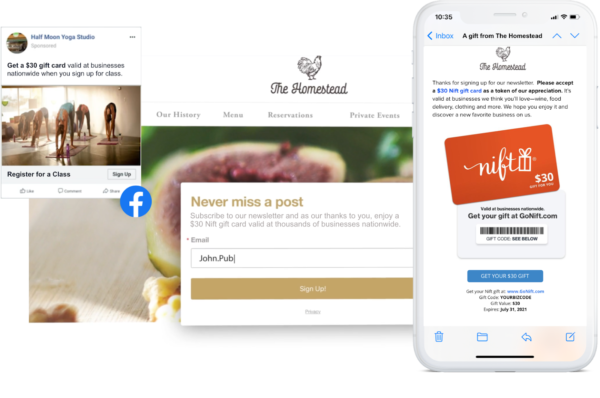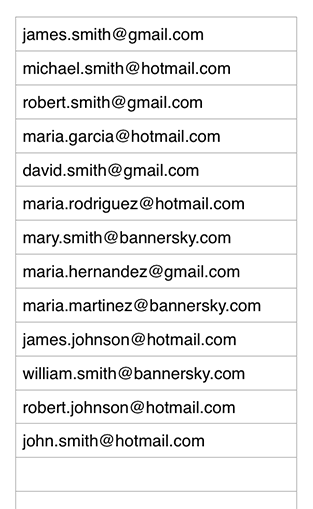20 New Facts For Deciding On Email List Sellers
20 New Facts For Deciding On Email List Sellers
Blog Article
What Should I Be Thinking About When Buying What Should I Consider When Purchasing A Cpa Email List?
Take note of these aspects when purchasing the CPA list (Certified Public Accountant). It is important to ensure the list is accurate high-quality, and in compliance with legal guidelines. Be aware of these elements: Quality and accuracy of the data
Source of Data: Verify the authenticity of the list. Trustworthy providers usually collect information from legitimate sources like professional directories, trade associations or databases. Avoid lists that are created through scraping data or employing unreliable techniques, as these might contain outdated or inaccurate information.
Verification process: Examine to see if the email list has been validated recently. This can reduce bounce rates and makes sure you're contacting valid, active email addresses. Since CPAs often change companies or jobs, you should ask how often the list has been up-to-date.
Segmentation/Filters: A CPA List should include options to be segmented by geographical location (city province and country), areas of specialization (e.g. accounting or auditing, or financial planning), number of years in operation, or the size of the firm. These elements can be utilized to increase the impact of advertising campaigns by providing more precise and targeted advertising.
2. Legal Regulations
Data Privacy Laws - Ensure that the email list is compliant with local and national regulations like the California Consumer Privacy Act. Lists must only contain email addresses that are legally obtained.
Conformity with the CAN-SPAM Act. For U.S. emails campaigns, the list of recipients must be in compliance with the CAN-SPAM Act. The Act regulates commercial electronic communications. It is important to provide opt-out options, and avoid using misleading subject lines or other content. Failure to comply could result in financial and legal problems.
Opt-in Consent: Check that email addresses have been obtained by opt-in consent. This means the recipients were willing to receive emails from marketing from third party companies. This decreases the likelihood of spam complaints and increases engagement.
3. Provider Reputation
Find out the track record and reputation of the company you choose to work with. Check out customer testimonials, case studies and reviews to get a feel about what customers who have used the service previously experienced. Data from established providers is more reliable and accurate.
Transparency. The service provider must be clear about how and when the data is updated. It's a red flag if the provider can't explain their methods clearly.
Customer Support - If seeking assistance with the customization of lists, troubleshooting issues, or compliance rules, then an experienced support team is crucial. A competent support team will help you save time and energy during the campaign process.
4. Cost and ROI
Pricing models. Different service providers have various pricing models. Certain charge per person and others have a flat-fee or subscription. Examine ROI with costs and compare price to high-end.
Refund Policy: Discover whether there is a procedure to refund or replace items when a certain number of emails were incorrect or not valid. A guarantee will give you piece of peace of mind.
Don't focus on price alone. A list's price may seem appealing but it could lead to poor engagement or high bounces when its quality is poor. Make sure you purchase lists that provide quality through accuracy of data and segmentation choices.
5. Data Usage, Ownership Access, and Ownership
Single-Use vs. Multiple-Use: Make sure you know if you're purchasing the list for a single use or if you own the data and are able to use it in ongoing campaigns. Although single-use list may be cheaper, owning your list allows you to run longer-term campaigns.
Shared Lists: Determine if the list is exclusive to you or shared with multiple buyers. shared lists: Determine if this list of email addresses is yours only or is shared by multiple buyers. Shared email lists can result in audience fatigue as recipients are bombarded with emails from various businesses.
6. Data Integration and Format
CRM compatibility: Ensure that the list that you receive is in a format that works with your marketing or CRM software. Examples include CSV and Excel. The information can be easily imported and managed.
Simple of Use: Examine how easy it is to segment and manage the data once it has been integrated into your system. A well-organized listing can help in making personalization and targeting more efficient.
7. Ethical Considerations
Relevance of content: CPAs can be working professionals with a lot of responsibilities. Therefore, it is crucial to provide them with relevant and valuable content. Inadequate messages can damage your brand's reputation or cause more complaints about spam.
Beware of sending too many emails Limit the number of times you email your contacts. The excessive frequency of communication could result in spam complaints and unsubscribes. It can also adversely affect the reputation of the person who sent it.
You can also read our conclusion.
When buying an CPA email list, prioritize the quality of data as well as legal compliance and the provider's reputation to ensure that your investment is worth it. With the right segmentation, you to get the most out of your engagement and ROI. Follow the most popular cpa email list for website guide.
What Are The Factors I Should Consider When Purchasing An Nurses Email Database?
It is important to consider certain aspects when purchasing an email list of nurses to ensure the list you buy is correct as well as compliant and appropriate for your outreach or marketing campaign. These are the most important points to keep in mind:1. Data Quality and Accuracy
Source: Check to ensure that the lists of email addresses originate from legitimate and reliable sources such as health directories, nursing associations, licensing authorities, or. Avoid lists created using untested methods such as scraping data because they could contain inaccurate or outdated data.
Verification & Update Frequency Verify that your provider is consistently updating and cleaning up their information. In order to remove inactive email addresses, inactive emails, as well as duplicates, a trusted email database must be maintained. Data accuracy is important to ensure better delivery and decrease in bounce rates.
Segmentation Options. A top-quality nursing email list should include segmentation options that are based on criteria such as nursing specialties (e.g. registered nurses, nurse practitioner critical care nurses) as well as areas (states cities, regions, states), or employment settings. Segmentation allows you to more precisely tailor your message to the audience, increasing the response rate and engagement rates.
2. Legal Regulations
Data Privacy Laws: Ensure the list complies with data protection regulations like the General Data Protection Regulation (GDPR) in Europe, the California Consumer Privacy Act (CCPA) in the U.S., and other regional or local privacy laws. In order for your company's name to be secured and to avoid penalties you need to collect email addresses legally.
CAN-SPAM Act Compliant: If you're implementing mail marketing within the U.S., ensure the list complies with the CAN-SPAM Act. The list should include distinct opt-out options as well as non-deceptive subject lines, and accurate sender information. Any violations can be punished with significant fines and can ruin your reputation.
Opt-in Consent: Contacts who are on the list of email recipients must have consented to receiving communications from third parties. The list will only include nurses who have signed up to receive emails from third-party companies.
3. Provider Reputation
Reputable Vendor - Choose one that has a track record of success in providing high-quality and accurate email lists. Check out reviews of customers, testimonials and case studies to determine the provider's reliability and quality of data.
Transparency. The company should be transparent in the methods they use to collect, verify and maintain data. If they are unable to clearly explain the data sources they use and their updates, it could indicate that the data is unreliable or outdated.
Customer Support: Select an organization that has a solid customer service. A good support team can assist you with any problems including questions regarding compliance or issues with integration of data.
4. Cost as well as Return on Investment (ROI)
Pricing Structure: Learn the pricing structure--whether the company charges per contact, according to list size, or as a flat fee. Make sure the price is aligned with your budget and your marketing goals.
Ask about the vendor's policies on refunds or replacements. Most reliable vendors will give you a refund or replacement for a specific percentage of non-deliverable or invalid contact information, so you can be certain that you're getting the value you paid for.
Focus on Value, Not just price: Although it might be tempting to pick a cheaper list, it is better to prioritize quality over cost. A costly list with high-quality data and well-defined segments will improve engagement.
5. Data Ownership and Usage
You can utilize the list for one time, or you can reuse it. Lists for single-use are typically less expensive however if you intend on running ongoing emails investing in a list that you can reuse might provide more value.
Shared lists are different from exclusive lists. Exclusive: Lists shared: Determine which list is exclusive to you, or is shared with other buyers. Exclusive lists have more impact because they reduce the oversaturation. This may result in higher engagement rates.
6. Data Integration and Format
Compatibility with CRM: Ensure that your list is presented in a CSV or Excel format that is compatible with every email marketing system or customer relationship management platform. This ensures a smooth and efficient integration process.
It is easy to segment It is important to keep the list designed to let you filter or segment easily by various factors. This allows you to focus on specific groups using targeted messages and improve the effectiveness your campaign.
7. Ethical Considerations
Relevance of outreach: Nurses are in the field of healthcare and are juggling their schedules. Therefore, it is important to provide relevant and valuable information. You should ensure that your message is pertinent to their profession. This could include healthcare products, education opportunities or even industry-related advancements. Beware of promotional or irrelevant content that could damage your brand's reputation.
Beware of spamming practices: Don't overwhelm your customers with numerous emails. Sending unnecessary or infrequent emails could result in a more unsubscribes as well as spam complaints, and may cause damage to sender reputation.
Conclusion
When buying a nurses email list, prioritize the quality of data as well as legal compliance. the reputation of the service provider. Lists that are segmented regularly and that respect privacy laws and have regular updates, will be more effective. When you invest in a successful targeted and targeted list, and then sending messages that are relevant and tailored to your audience, you will increase the number of people who engage and reap the benefits of investment. Check out the pro nurses email list for site recommendations.